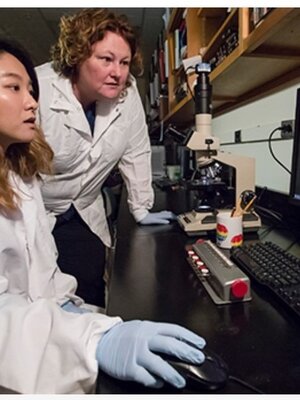
How would you describe your background? (I.E. where you are from? How did you first get interested in your area of research? Etc.)
I always wanted to do biology. I always found that interesting, I took AP biology in high school and said, “This is what I want to major in.” Even though I went to two different undergrads, I was always a biology major. I guess I would say I say that my Ph.D. and post-docs were all in hormones and biological rhythms. I entered graduate school to do reproduction, but I had a lab that also did biological rhythms, which I knew nothing about. So that’s the area I’ve been in since 97.
What is your favorite part about research? (Learning new things you didn’t expect, presenting the information at conferences, the writing process, etc.)
I think that’s changed in different stages of my career since when I was a graduate student, I loved being in lab and collecting the data. I loved working with animals, but now I find I don’t need that as much. I really love getting the new data and thinking about what they mean, so I’m happy to have graduate students and undergrads to help me with the research. Now I’m excited by the paper and the data we’ve collected more than the lab work.
I guess a comment would be that I’ve also consistently enjoyed mentoring throughout all stages [of my career]. That hasn’t changed. While I like the research, different areas interest me, but helping other students get into research has always been an interest of mine.
What made the University of Illinois a good place to conduct your research?
The job description was a perfect match to me. It wanted someone who can do reproduction, which is what my department is strong in. It wanted someone who had experience with toxicology, which I have done a post-doc in toxicology. It had previously had someone who had studied biological rhythms and that was in the job description, and it wanted someone who was good at teaching and I had a history of teaching. When I was at Michigan, I taught two classes a semester.
It was like a job description written for me. It had all my research interests matching, it had my teaching interests matching, the department was really strong in the areas that I did research in.
What do you do in your spare time?
Well, I have two kids. They’re twelve and fifteen, so now they take up less time than they use to. I’ve gone through different phrases. I’ve gone through a sewing phase where I made pencil cases—I just got obsessed with pencil cases, but I enjoyed sewing, some amount of reading, wine tasting, what else do I do?... Not a whole lot, I’m still rediscovering my free time, since the kids can now do their own thing.
Last summer we went to every free music event we could find, this summer we’ve done less of that, but we like going out to eat.
Can you talk about a time where you were greatly challenged?
I had an experiment that involved pulling all-nighters. We were collecting samples from animals every two hours and we did this four or five times a night. I stayed in my room, I would get up and sleep in my office, and we do this every two hours. Then the freezer that the samples were in broke.
I had someone in my lab for the summer. I asked her “Go get these samples,” and she said, “Yeah, they’re kinda warm.” I was like “What are you talking about?” I was devasted, absolutely devasted. That was one of the major setbacks, we ended up having to repeat all the experiments.
That, that was definitely a challenge. Now, we have backup freezers and we have alarms and everything like that.
What’s a fact about you that people don’t expect to learn?
Hum… I guess people are not surprised that I’m from Bosten because I talk really fast. Usually, I surprise people by telling them that when I was in high school I was in a Revolutionary War reenactment group. I played fife in a fife and drum band. We did a lot of parades, wore tricorn hats, played Yankee Doodle.
Did you tar and feather?
No, there was a group that liked to be pirates and they also […] march in bare feet, wear striped shirts, kidnap people and carry them, but we didn’t. We were a nice group.
If someone in the program, a student or a colleague, needed to refer to you but did not know your name, how would you prefer for them to describe you?
Circadian Biologist